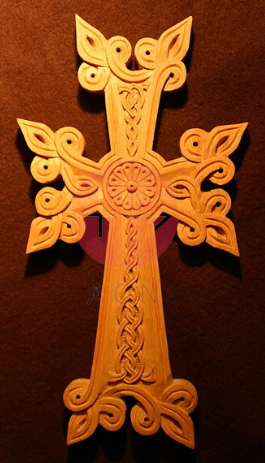Armenians fear for their Future
It is hard to think of a Christian people who have suffered so much in their history as the Armenians. The South Caucasus was recently witness to a war between Armenia and Azerbaijan. The fighting has stopped for the time being, but many Armenians are left fearing for their future in the Armenian homeland.
By ACN Staff
A procession for those who died in the Armenian Genocide. (Credit: Aid to the Church in Need)
When a western European hears the words “Armenia” and “Armenians”, the most likely thing to enter their head is the Armenian Genocide. There is no doubt that the genocide has scarred the Armenian people to this day. Armenian history is much more than just the genocide. Armenia was itself a major player in Persian, Roman and Byzantine history. Armenia also has an important role in Christian history. Armenia competes with Ethiopia for the distinction of being the first country to proclaim Christianity as its national religion.
The Eternal Flame in memory of the Armenian Genocide in the Armenian capital Yerevan. (Credit: Aid to the Church in Need)
Armenian Genocide memorial in the Armenian Capital Yervan. (Credit: Aid to the Church in Need)
Many of us were horrified to see the scenes in destruction in recent weeks, as Armenia and Azerbaijan went to war. On the 9 November, a ceasefire agreement was signed by Armenia and Azerbaijan, with Russia acting as guarantor. Under this agreement hostilities would cease; Azerbaijan would be allowed to keep all territory which it has seized, and Russia would deploy peacekeepers in the disputed Nagorno-Karabakh region for the next five years.
Aid to the Church in Need (ACN) spoke with Fr. Bernardo de Nardo, an Argentine priest who ministers to Latin Rite Catholics in Armenia. Fr. de Nardo explained that this dispute goes back to time of Joseph Stalin when Armenia was part of the USSR. As part of a policy known as “ethnic mixing”, Stalin moved the historically Armenian region of Nagorno-Karabakh into Azerbaijan. When the Soviet Union collapsed in the 1990s, Azerbaijani nationalists started to attack the Armenians. The newly independent Armenia went to war to defend the Armenians in the Nagorno-Karabakh region and defeated Azerbaijan. In the aftermath of this conflict Armenia recognised Nagorno-Karabakh as an independent state, but in practical reality the region became part of Armenia.
The region had continued to be a source of controversy between Armenia and Azerbaijan. Azerbaijan has a much larger population than Armenia, and since the 1990s Azerbaijan has become much wealthier due to oil revenue. It was for this reason that Armenia was outmatched in the latest conflict. Fr. de Nardo expressed his frustration at larger countries who seemed more concerned with selling weapons and cashing in on oil revenues than saving human lives in this bitter conflict.
An Armenian cross. (Credit: Aid to the Church in Need)
Fr. de Nardo has also spoken of the anger and fear that many Armenians are feeling at the present. This is over the fact Azerbaijan will control historic Armenian territory in parts of the Nagorno-Karabakh region. This practically means thousands of Armenians will have to flee and historic churches will be turned into mosques. At present churches, monasteries and religious communities in the areas Azerbaijan is occupying are under the protection of Russian peacekeepers. Under the current agreement the Russian troops will only be in the area for the next five years, sparking fears of what will happen when they leave. This is a realistic fear as Azerbaijan has previously destroyed a seminary in Naxichevan, a region of Azerbaijan which borders Armenia proper. Like with most wars, this current conflict is partly motivated by political and financial concerns, but there is also certainly an aspect of Islamic expansionism in the South Caucasus on the part Azerbaijan and Turkey. Given the recent setbacks and also the history of the Armenian people, it is understandable why so many Armenians are fearful for their future.
An old church and graveyard in Azerbaijan. (Credit: Aid to the Church in Need)
Fr. de Nardo had spoken of the good relationship between the Catholic Church in Armenia and the majority Armenian Apostolic Church. ACN Ireland would ask all our benefactors and supporters to join our Armenian brothers and sisters in prayer. Let us prayer, through the intercession of Our Lady, that world leaders will stand up for Armenian people, and that Our Lord God may protect and guide this most ancient of Christian nations.





